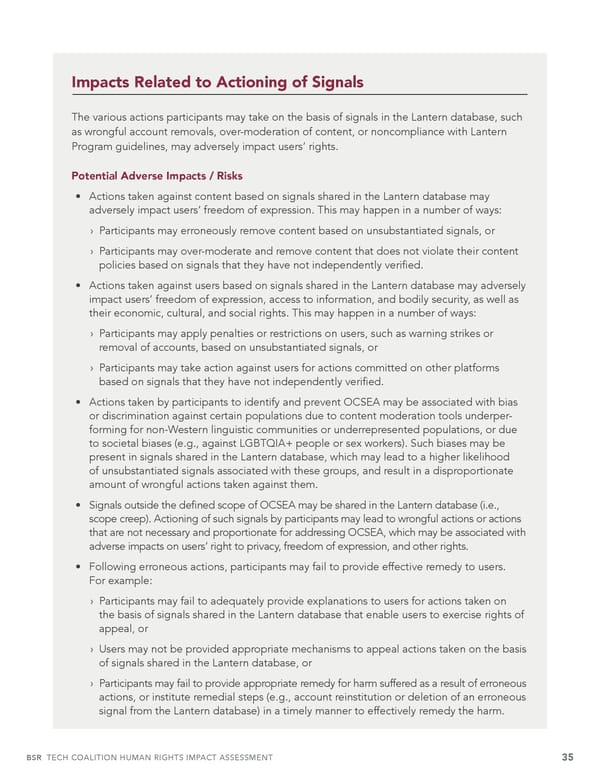Impacts Related to Actioning of Signals The various actions participants may take on the basis of signals in the Lantern database, such as wrongful account removals, over-moderation of content, or noncompliance with Lantern Program guidelines, may adversely impact users’ rights. Potential Adverse Impacts / Risks • Actions taken against content based on signals shared in the Lantern database may adversely impact users’ freedom of expression. This may happen in a number of ways: › Participants may erroneously remove content based on unsubstantiated signals, or › Participants may over-moderate and remove content that does not violate their content policies based on signals that they have not independently veri昀椀ed. • Actions taken against users based on signals shared in the Lantern database may adversely impact users’ freedom of expression, access to information, and bodily security, as well as their economic, cultural, and social rights. This may happen in a number of ways: › Participants may apply penalties or restrictions on users, such as warning strikes or removal of accounts, based on unsubstantiated signals, or › Participants may take action against users for actions committed on other platforms based on signals that they have not independently veri昀椀ed. • Actions taken by participants to identify and prevent OCSEA may be associated with bias or discrimination against certain populations due to content moderation tools underper- forming for non-Western linguistic communities or underrepresented populations, or due to societal biases (e.g., against LGBTQIA+ people or sex workers). Such biases may be present in signals shared in the Lantern database, which may lead to a higher likelihood of unsubstantiated signals associated with these groups, and result in a disproportionate amount of wrongful actions taken against them. • Signals outside the de昀椀ned scope of OCSEA may be shared in the Lantern database (i.e., scope creep). Actioning of such signals by participants may lead to wrongful actions or actions that are not necessary and proportionate for addressing OCSEA, which may be associated with adverse impacts on users’ right to privacy, freedom of expression, and other rights. • Following erroneous actions, participants may fail to provide effective remedy to users. For example: › Participants may fail to adequately provide explanations to users for actions taken on the basis of signals shared in the Lantern database that enable users to exercise rights of appeal, or › Users may not be provided appropriate mechanisms to appeal actions taken on the basis of signals shared in the Lantern database, or › Participants may fail to provide appropriate remedy for harm suffered as a result of erroneous actions, or institute remedial steps (e.g., account reinstitution or deletion of an erroneous signal from the Lantern database) in a timely manner to effectively remedy the harm. BSR TECH COALITION HUMAN RIGHTS IMPACT ASSESSMENT 35
 Tech Coalition Human Rights Impact Assessment of the Lantern Program Page 34 Page 36
Tech Coalition Human Rights Impact Assessment of the Lantern Program Page 34 Page 36